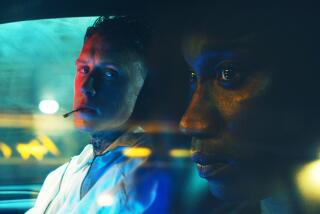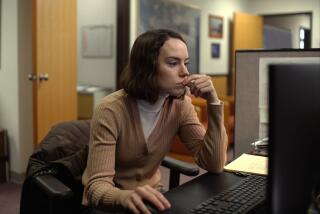The Contenders: Felicity Jones on her impulsive ‘Like Crazy’ role
Going into Sundance, “Like Crazy” was a modest relationship drama from a director, Drake Doremus, whose previous film bore the arm’s-length title “Douchebag.” But one teary-eyed premiere and a $4-million bidding war later, it emerged as the film festival’s most dramatic success story, an upward trajectory capped by awards for the film and for Felicity Jones’ performance. As a young woman whose passionate crush on a college classmate (Anton Yelchin) blossoms into a long-distance relationship battered by transatlantic crossings and immigration woes, Jones loves not wisely but too well, her naive romanticism laying the groundwork for an agonizing series of separations and reunions. As her troubles multiply, the fair-skinned Jones becomes almost translucent, each setback peeling off another protective layer. By the end, there’s almost nothing left.
The film was shot on a consumer video camera, which could almost make it feel like you’re not really making a movie. How did that affect the process?
I think that really helped. In the past, I’ve found it extremely nerve-wracking, standing with a huge camera and 50 people watching you. Being able to produce a performance of any interest from that is extremely difficult, so this was exactly the kind of way that I like working. It would only be three of us on set a lot of the time. That level of intimacy means that as a performer you can take risks, and you can be silly and not worry about what everyone is thinking.
You weren’t sent a script in advance, right?
There was a “scriptment” — I think we should see if we can get this word into the dictionary. It’s a cross between a script and a treatment. It’s more like a short story. It has a very clear idea of what the characters are. It has elements of their back story, and it has elements of each scene and what has to happen. We have very clear objectives for every scene, but then you as the actor have to find a way of doing it that’s as naturalistic and believable as possible.
You had access to letters and such from the person your character was modeled on?
Absolutely. That was really, really helpful in understanding Anna, having that insight into some of the people that had been in Drake’s life. I understood why she makes these irrational, impulsive decisions, because she’s that kind of person. I was worried when I first watched it that she was too spoiled. I remember saying to Drake, “People may hate her.” She’s not your typical film protagonist, because she hasn’t come out of heartache and trouble. Those are usually the people we like to watch. So it was quite interesting playing someone who’s completely unjaded and very innocent, and probably comes from quite a privileged background. From that starting point, I can see why she doesn’t have to be cautious.
For an actor, long-distance relationships are an occupational hazard. Did you identify with that part of the story?
Definitely. You inevitably bring in your own things, your own discussions that you’ve had. You can’t help but bring that into the work. At the same time, you want [the characters] Anna and Jacob to be something different. With Anna, the hardest things were the decisions she makes. She’s incredibly impulsive and in love with Jacob almost to the point of obsession. The scene where I had to say I’m going to overstay my visa was really difficult. Drake and I had so many discussions about it. I just thought, ‘This woman’s insane!’ Part of your job as an actor is to make the insane seem believable and empathetic.
You’ve been adamant about not discussing your personal life, but when you’re responsible for filling in so much of the character yourself, how do you draw the line?
I think there has to be a separation. Playing Felicity wouldn’t be very interesting. She takes a long time to make decisions and she isn’t very impulsive, so there wouldn’t be a story. But the boundaries do become blurred. I wrote the letter that Anna writes to Jacob. I read it just the other day, and I thought, ‘Oh, my God, who is that person?’ But at the time, you do get very involved in your work, and afterwards, you realize there’s a definite person there who’s very different from me.
More to Read
The biggest entertainment stories
Get our big stories about Hollywood, film, television, music, arts, culture and more right in your inbox as soon as they publish.
You may occasionally receive promotional content from the Los Angeles Times.






